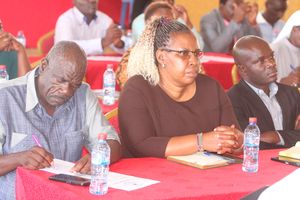
Teachers Service Commission CEO Dr Nancy Macharia appears before the Constitutional Implementation Oversight Committee at Continental House, Nairobi, on April 8, 2025.
The Teachers Service Commission (TSC) has sounded the alarm that the country is facing a teacher crisis, blaming it on budgetary constraints that hinder the hiring of more staff.
The commission on Monday (April 8) told a parliamentary committee that the shortage stands at 98,261, including Junior Secondary School (JSS) slots.
TSC Chief Executive Officer Nancy Macharia told the Constitution Implementation Oversight Committee (CIOC) that the number is set to rise next year following the rollout of senior schools.
“The lack of an adequate budget to recruit teachers has led to shortages in public schools, therefore impeding the right to access basic quality education enshrined under Article 43 of the Constitution,” Dr Macharia told MPs.
More shocking was Dr Macharia’s revelation that there was lack of qualified teachers to handle some subjects in the Competency-Based Curriculum.
Leather craft, picture making, sculpture, jewellery and ornament making, media technology, woodwork, marine and fisheries technology, general science, and indigenous languages are among the subjects that lacked trained teachers.
Dr Macharia said the commission has written to universities and colleges offering teacher training about the lack of instructors in these subjects, but is yet to get any response.
“We have no teachers for these subjects, and, so far, we have not seen these teachers being churned out by the universities and colleges,” she said.
“I have appeared before the Education Committee over this, but we are still waiting for the teachers to be trained so that we can hire them,” she added.
Dr Macharia told the committee that the TSC has provided advisories to the national government on training new teachers in the new subjects.
The shortage now puts the successful implementation of the CBC syllabus at risk as more learners are expected to transition to Grade Nine next year.
Lawmakers, however, put the commission to task, accusing it of poor distribution of teachers across the country.

Tongaren MP John Chikati,
Tongaren MP John Chikati said that despite the budgetary constraints TSC is complaining about, the commission is accused of skewed posting of teachers, which has left many schools with few instructors.
“We understand the problem with the budgetary allocations, but the problem with the TSC is the imbalanced distribution of teachers. Why can’t we have a uniform distribution across the country?,” asked Mr Chikati.
He also said that the commission has been skewed in its employment practices, adding that teachers who graduated earlier are being disregarded in favour of the ones who are freshly minted.
“You will find that a teacher who got a TSC number in 2009 has not been employed, yet another one who got a TSC number in 2022 is already employed. Why can’t we have a system where those who graduated earlier are employed first?” Mr Chikati asked.
Embakasi Central MP Benjamin Gathiru faulted the government for introducing subjects that have no teachers.
“When these subjects are being introduced, is TSC being consulted? We know that some learners are interested in these subjects, but what happens to them now that there are no teachers?” He asked.
Matungu MP Peter Nabulindo wondered why many trained teachers are still loitering in villages unemployed while the TSC is complaining of a shortage.
“Why do we have millions of teachers who are yet to be absorbed, yet we continue to train more? Can’t we only produce what we can absorb?” The MP questioned.
The MPs said teachers are poorly distributed, some schools are overstaffed while others have only three tutors.
Dr Macharia said the commission relies on the delocalisation policy that was endorsed by Parliament when deploying teachers. She added that county and sub-county education directors have the powers to redistribute teachers.

Erick Muchangi.
Committee Chairman Erick Muchangi said: “This committee will require you to furnish it with the status of teacher distribution across the country. From there, we will be able to see how teachers are deployed in schools.”
The commission also came under fire over the issuance of employment letters by MPs and senior government officials in public forums.
Mr Nabulindo, the Matungu MP, told the TSC to come clean on whether it has ceded its mandate to recruit teachers.
“We have seen prominent people peddling employment letters in public forums. We have seen senior public officials, even at the level of a Cabinet Secretary, issuing these letters, despite this being the function of TSC,” said Mr Nabulindo.
Mr Muchangi said the practice of dishing out employment letters in public is setting a bad precedent.
“It’s unfair that someone who has been teaching in a private school for 10 years sees employment letters being dished out by politicians. It’s just unfair,” he said.
The revelation about MPs issuing employment letters was made last week by Murang’a Woman Representative Betty Njeri Maina, who said MPs aligned to the government were given TSC employment letters to distribute to their constituents.
“We were called to State House, and I will say it openly. We were given letters for the employment of teachers. I went with eleven MPs from Kiambu, and each was given twenty letters, totalling 220,” she said.
She added that those who did not attend the State House meeting failed their constituents, as they would miss out on job opportunities.









